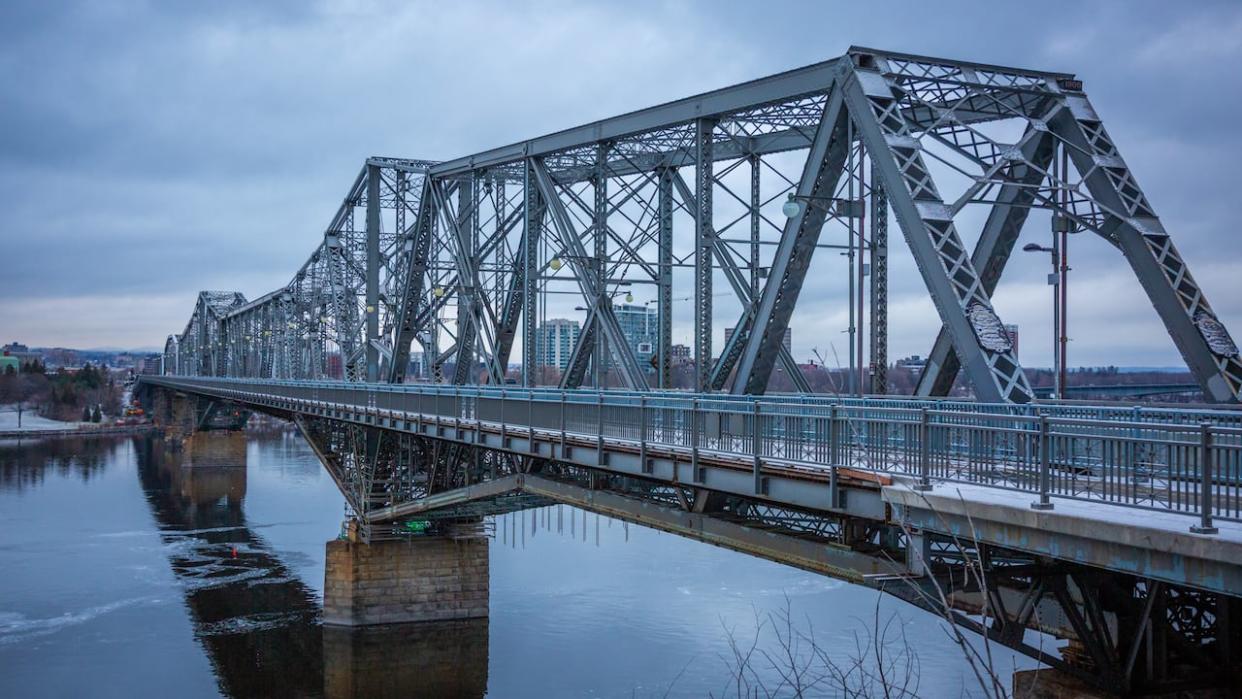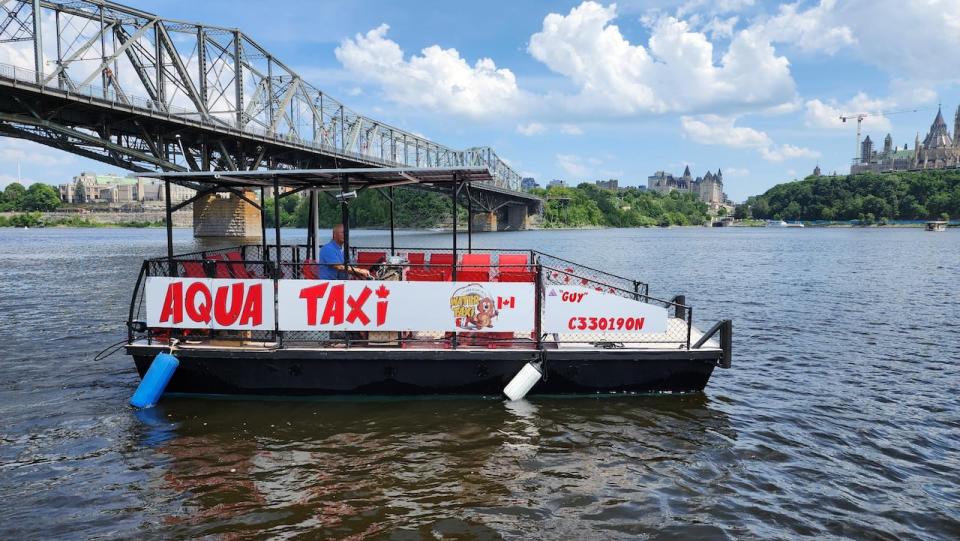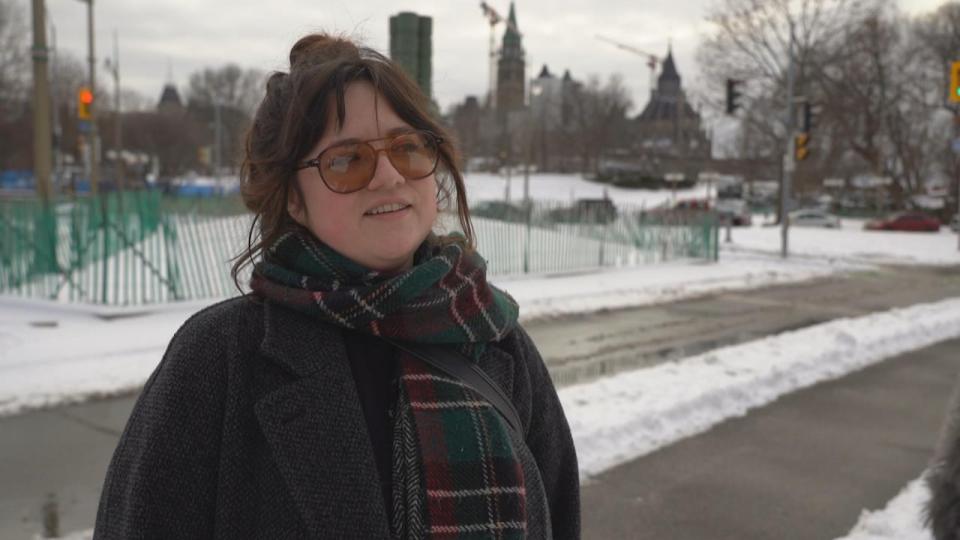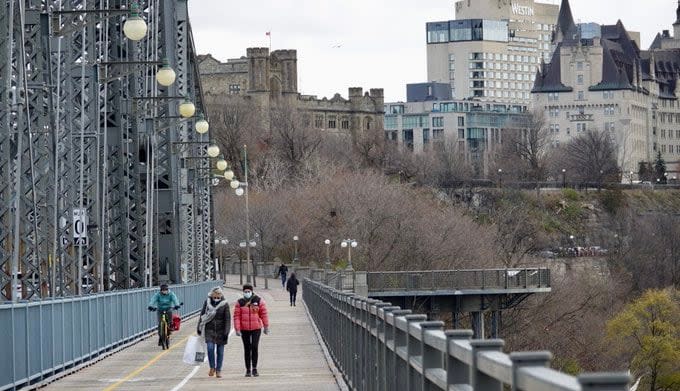Water taxis could help fill gap during Alexandra Bridge closure

The federal government is considering extending the Ottawa River water taxi season to help commuters during reconstruction of the Alexandra Bridge, but some locals and officials are questioning how that would work.
According to the National Capital Commission, the 123-year-old bridge that stretches between Ottawa and Gatineau, Que., is reaching the end of its service life and is due for a replacement between 2028 and 2032
It's currently closed to vehicles, meaning the next closest options for drivers of the four city vehicle bridges are the Macdonald-Cartier Bridge to its east and the Portage Bridge to the west on the other side of downtown.
When it closes to active users such as pedestrians, cyclists and wheelchair users, what used to be about a one-and-a-half kilometre trip between the main doors of the national gallery and history museum would become a 2.3 kilometre trip over the Macdonald-Cartier.
The work is part of why Toronto-based Water Taxi Eh? expanded to the capital last year. Co-owner Luc Cote said he saw a major opportunity down the line.
"We would hope that we would be the provider when the bridge comes down or during the deconstruction and construction phase," he said.

Luc Cote, co-owner of Water Taxi Eh?, says he doesn't think it is logistically capable to expand the water taxi season and would likely be a substantial investment. (Igor Chernets/Submitted by Luc Cote)
In its project summary, Public Services and Procurement Canada (PSPC) writes that it's looking at expanding the water taxi season, which currently runs from May to October, by using a de-icing system on the river. The target is those active users.
Cote isn't convinced PSPC's plans for water taxis in the winter will work.
"It would have to be a dedicated boat that could carry passengers and break ice," Cote said. "It has to be a big boat. It can't be little passenger boats."
There's "no way" the small, 12-passenger water taxis his company operates would work, he added.
Thousands of drivers used the bridge daily
It's not only the kind of boat that needs to be considered, but also the capacity.
The Alexandra Bridge took more than 3,000 pedestrians and cyclists between the two provinces on average a decade ago, according to the study, or about one-third of daily active crossings.
Before the year-long closure that began in October, roughly 13,300 vehicles drove across the Alexandra Bridge every day, according to a 2017 City of Ottawa traffic study.
Emily Kells, an Ottawa resident who uses the bridge almost daily, said she can't see herself using a water taxi while the bridge is under construction.
"I used to live in Victoria, so I'm familiar with water taxis. It seems more like a tourist thing than a practical thing," Kells said, adding her first thought is, "how would that work in the winter time?"

Emily Kells lives in Ottawa, but commutes to Hull regularly to visit her partner. It's a walk she enjoys doing, and says she doesn't imagine she'll use a water taxi instead when the bridge is under reconstruction. (Francis Ferland/CBC)
Those details are still being fine-tuned in the planning and design stages. PSPC's report added that "seasonal limitations will be essential to tailoring the appropriate mitigation" when it comes to the use of water taxis or other transportation methods.
Other options mentioned include tourist shuttle buses and boosting public transit.
PSPC did not respond to CBC's request for comment by deadline.
Varying municipal concerns
City councillors on both sides of the Ottawa River have varying concerns.
Ottawa's Rideau-Vanier Coun. Stéphanie Plante isn't opposed to the taxi boat idea. Her concerns for the bridge's transportation between the two sides go beyond that.
"Our long-term focus here is to try to create safe spaces for people who want to use alternative modes of transit, not just their car, and we'll see how that goes. I haven't seen the plans," Plante said.

Before the Alexandra Bridge was closed to motorists in October, thousands of drivers would cross the bridge daily. (Ian Black/CBC)
Hull-Wright Coun. Steve Moran said he also hasn't seen the plans.
"I'm not entirely convinced yet at this point that we have to deconstruct the bridge. We're still waiting on the full heritage report on what is the value of it," Moran said.
"We're also waiting on a report for the regional transport and how we move people from one side of this river to the other and how we do it in a sustainable way," he said.
Moran adds that water taxis are interesting, but likely not the full solution.


